Round-up: 2025 Early Career Grants Programme applications
In this blog, RSTMH Grants Manager Greta Holmes looks at the applications to this year's Early Career Grants programme – another record-breaking year for applications.
We are once again delighted to see an increase in the number of applications to our Early Career Grants Programme this year – receiving 3,663 applications compared to 2,828 last year.
The aim of our Early Careers Grants Programme is to help encourage the next generation of global health and tropical medicine professionals by providing them with the opportunity to conduct their first piece of research. The grant provides them with up to £5,000 to undertake a one-year research project in any area of tropical medicine or global health.
The Programme funds projects across the research spectrum, from initial lab-based studies, through translation, implementation, community and policy-related research. Across 3,663 applications, there is an enormous variety of problems and research questions in global health or tropical medicine to tackle. We hope these projects will help to identify the innovations and discoveries that change all of our work, helping us to achieve health equity and the eradication of even more diseases.
We are now working with our team of Global Assessors to check and assess all the applications and will update you over the coming months on when the funds will be awarded.
In the meantime, we wanted to share some data on the diversity and breadth of the applications.
Number of applications
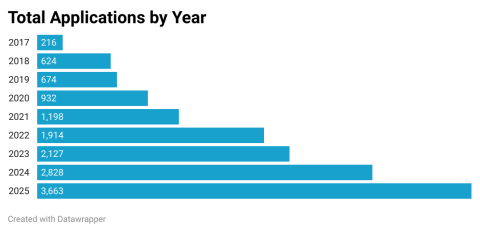
This year applications have increased by 29.5% to reach 3,663; a huge jump from just 216 in 2017.
In 2024 we awarded 299 grants, which maintained the chances of achieving an award as just over 1 in 10. Since 2017 the chances have improved from 1 in 39.
Gender balance
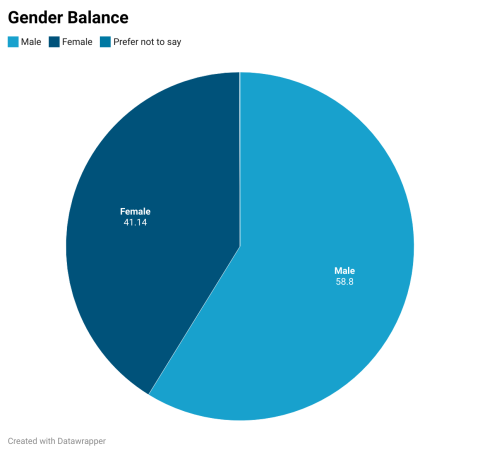
This year the gender split of applicants is 59% male and 41% female, with 2 applicants preferring not to say. This represents just a 1% difference from 2024’s applications (57% male and 42% female), and given the increase in number of applications, it’s great to see we are still achieving a similar gender split.
We continue to do all we can to try and achieve and maintain an equitable balance at this very early research level, as we are aware that the gender gap between male and female widens significantly at more senior levels in our sector.
Nationality
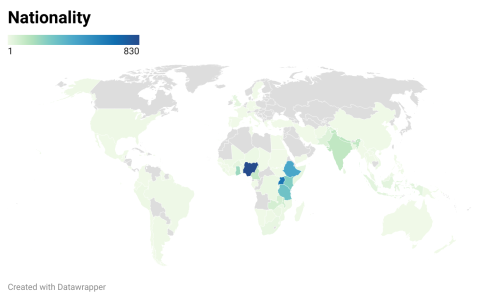
This year our applicants represented 87 different nationalities; a decrease from 88 last year.
The map shows the range of applications across regions of the world, with many regions showing at least one application. 26 nationalities were represented by just 1 applicant, and all 6 main continents are represented.
The nationalities which saw applications of 100 or more were Nigerian (830), Ugandan (638), Ethiopian (419), Tanzanian (301), Kenyan (254), Ghanaian (196), Nepalese (127), Indian (113), and Cameroonian (103).
We would like to thank our Student and Country Ambassadors, our members, Fellows and networks for continuing to raise awareness of the programme.
Please be aware that the maps used here are Mercator Projections, and do not accurately reflect country sizes. Countries further away from the equator are inflated in size.
Where research is being carried out
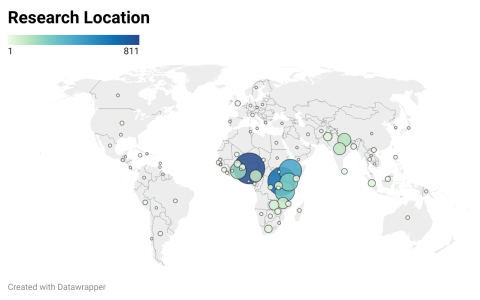
The countries where research is being carried out this year largely match the countries where our applications are based, as you can see from the map above. The number of countries where applicants are proposing to conduct their research has again fallen, from 107 in 2023 and 96 in 2024, to 87 in 2025.
The top countries in terms of research projects match exactly the countries mentioned before, under nationality.
This reflects the incredible range of countries of relevance to our work, and we are so very proud to be able to consider applications from so many countries and regions of the globe.
Please be aware that the maps used here are Mercator Projections, and do not accurately reflect country sizes. Countries further away from the equator are inflated in size.
Topic area
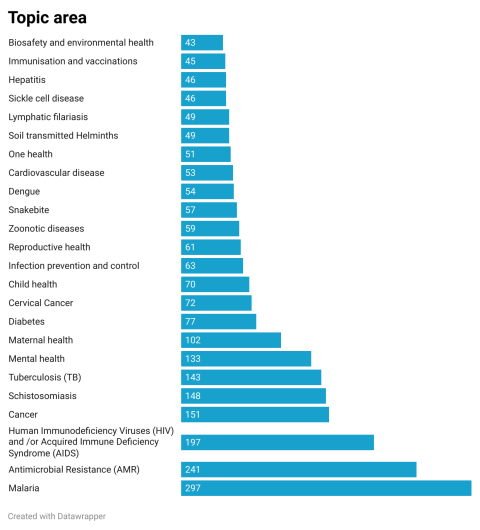
As part of their application form, applicants were asked to pick a main focus area for their study, which has enabled us to classify the projects across 114 areas of global health (from a list of 116 options, including ‘other’). We accept this is a very simplified view of the studies which often involve multiple disease areas or topics, and which describe their focus in different ways.
As with last year, the spectrum of disease and global health topics is very broad.
Diseases and areas of health being studied by more than 100 applicants are Malaria (297), Antimicrobial Resistance (AMR) (241), HIV/AIDS (197), Cancer (151), Schistosomiasis (148), Tuberculosis (143), Mental health (133) and Maternal health (102). This follows a similar pattern to last year.
In 2025, we listed NTDs and NCDs more specifically for applicants to choose from, which is why they have not been grouped as they have in previous years. 36 different diseases/health areas received 5 or fewer applications, which highlights the broad range of areas covered.
It is great to see the disease and health areas of the research ideas broadening out alongside the well-established and important areas we have been working on for some time.
Sectors
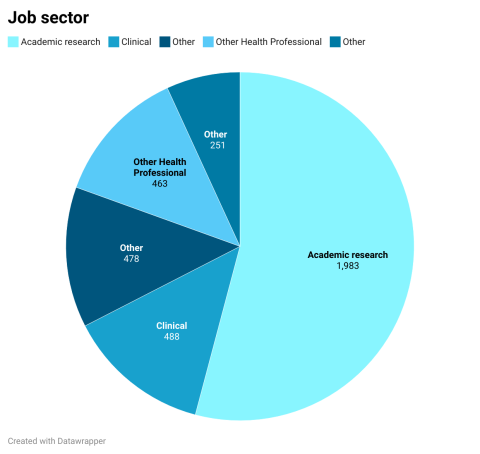
We ask applicants to tell us which sector they are working in to measure our goal of ensuring all those working in tropical medicine and global health can access our Early Career Grants, regardless of the sector they are in. In this way we aim to broaden the range of individuals involved in research at an early stage.
This year, we received 1,983 applications out of 3,663 from the world of academia (54%). Clinical settings and other types of health professionals both contributed over 450 applications.
Moving forward we will continue to encourage as broad a participation as possible.
Supply and demand
Last year, we were lucky enough to have support from donors such as NIHR, CIFF, LSHTM, JCPET, and IACS who were able to fund over 295 awards in total. A further 4 awards were funded directly by RSTMH, with funding available exclusively for members.
We are currently in discussion with a range of current and new donors and will be sharing an update on this soon in the newsletter and on our website.
It is our hope to be able to fund as many quality applications as possible this year, although this depends on topic areas, assessments and other funds available.
If you know of any partners who may want to join in the success of the programme by funding a number of early career researchers, please tell them to get in touch.
Watch this space for further reports as we move through the assessment to awarding our next group of applicants. We wish all applicants who are through to the next stage of assessment the very best of luck.